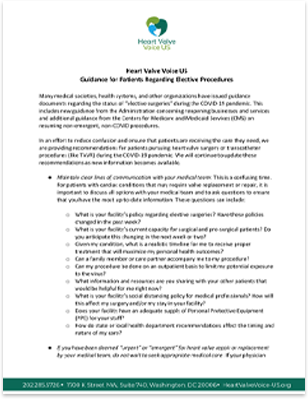
Stop wondering.
Talk to your doctor.
If your transcatheter aortic valve replacement (TAVR) procedure was delayed due to COVID-19, now might be the time to reschedule.
Talk to your heart team about moving forward with your procedure.

of severe aortic stenosis patients are nervous/very nervous about in-person doctor visits1

of patients are seeing or talking to their doctor less frequently now than before COVID-191

of severe aortic stenosis patients plan
to pursue treatment in 20201
1. Patient Hesitancy on Healthcare Decisions During COVID-19 Crisis. Internal Boston Scientific report. July 6, 2020.
While hospitals are taking many steps to keep patients safe during this time, each state has different guidelines about which procedures can be done right now. If your severe aortic stenosis has reached a point where treatment is urgent, your heart team may recommend you get TAVR done immediately. If your case is less urgent, your doctor may recommend waiting.
COVID-19 and
heart valve disease
This video from the American Heart Association answers common questions about moving ahead to schedule your TAVR procedure.
Dr. Suzanne V. Arnold, a cardiologist at St. Luke’s Health System in Kansas City, weighs the risks of having it now versus waiting.

Guidance for patients
regarding elective
procedures
This guide sums up the latest recommendations for people considering a TAVR procedure during COVID-19. It includes five key considerations and tips.

Protect against
stroke risk
When the time is right to reschedule your aortic valve replacement, be sure to ask your heart team about the SENTINEL™ Cerebral Protection System, which can help protect you from stroke risk related to TAVR.
